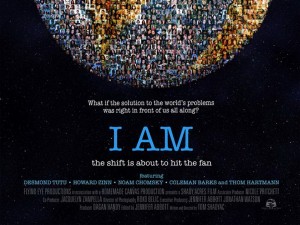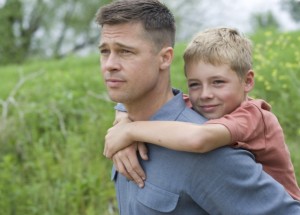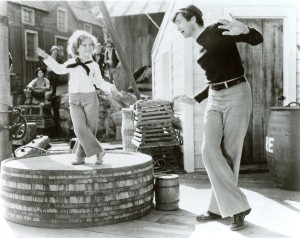Interview: Tom Shadyac on the DVD Release of ‘I Am’
Posted on January 2, 2012 at 12:03 pm
 I spoke to Tom Shadyac last March about shifting from big Hollywood films like “Ace Ventura: Pet Detective” and “The Nutty Professor II” to a small and very personal documentary about just about everything called “I Am.” Shadyac was one of the most successful directors in Hollywood when bicycle accident left him in terrible pain, physical and spiritual. He began to think about the emptiness of his form of success and he began to study two questions: what’s wrong with our world, and what can we do to make it better? He documented his own journey, including fascinating encounters with people who are questioning some of our most fundamental assumptions about the way we interact with each other and the universe, from cutting-edge scientists to people who study history, culture, and theology.
I spoke to Tom Shadyac last March about shifting from big Hollywood films like “Ace Ventura: Pet Detective” and “The Nutty Professor II” to a small and very personal documentary about just about everything called “I Am.” Shadyac was one of the most successful directors in Hollywood when bicycle accident left him in terrible pain, physical and spiritual. He began to think about the emptiness of his form of success and he began to study two questions: what’s wrong with our world, and what can we do to make it better? He documented his own journey, including fascinating encounters with people who are questioning some of our most fundamental assumptions about the way we interact with each other and the universe, from cutting-edge scientists to people who study history, culture, and theology.
It’s my DVD Pick of the Week and I am delighted to have a copy to give away. Send me an email at moviemom@moviemom.com with I AM in the subject line and don’t forget your address. I’ll pick a winner at random on January 8.
Good to talk to you again! Tell me what the reception to the film has been since we spoke in March.
We went on a little show called “The Oprah Winfrey Show” with her audience of 20 million. So that changed the awareness of “I Am” and we began to get a lot of requests for seeing the film because it wasn’t available in every city. We’re finally meeting that request with the release of the DVD on January 3. She’s such a powerful voice in media and such a supporter of the film that we decided to have the broadcast debut on her network, OWN. We’ve continued touring the country and doing Q&A’s and trying to start the conversation wherever we could.
What are some of the questions you get asked by people who have seen the film?
Are you crazy? That’s one I get asked a lot. No, the most common questions are things like “What do your show business friends think of this?” As though that’s an indictment! What do you do when people don’t see what you see? How do you change those people? It’s not my job to change anyone. It’s my job to share what I know and feel passionate about. Are you a communist? Are you a socialist? Those are some of the questions I get asked. Many people take exception because they think my ideas are utopian and not grounded in reality. But I did a film about the ultimate reality. I call it the ultimate reality show.
Have people brought their own stories to you?
Of course! I hear all the time from people whose lives and perspectives are changed by the film. Some meet the film by brain injury so they tell me they were suffering from something similar or some other life challenge physically. I hear from people who are simplifying their life or stepping more into their passion, people who are leaving money for meaning. There are also some schools creating curriculums around “I Am.”
That’s great! I especially like exposing students to your integrated approach of looking at issues from the molecular level up to the cosmic level.
It’s all the same. When I began to explore different disciplines I realized that the academics, the poets, the mystics, the scientists, the spiritualists are all saying the same thing, telling the same story. Life is life. Life shows up everywhere, science and poetry. The truths that undergird life transcend all boundaries.
What are you reading now?
Thomas Merton‘s philosophy was that you can read every book or you can read a handful of books and become those books. I continue to read the people who light up my soul are writers like Daniel Ladinsky’s translation of Hafiz
and Rumi
— Coleman Barks’ translation, Mary Oliver
, Emerson, Rilke, I just hover in those worlds. I do dust jacket reading on a lot of things but I keep going back to those.
And what about music?
I’m not the hippest cat in the room, but I love music. One of my favorite parts of the movie business is scoring — it’s just an opportunity to add a beautiful piece of music to the world. I even listen to what the young folks are listening to!
What was it like for you, after directing supremely confident performers like Jim Carrey and Eddie Murphy, to step in front of the camera for the first time — as yourself?
It was really awkward at first. My 20-year history in show business had always been talking to that person in front of the camera. But we worked so quickly, shooting and then editing, that it was surprising how quickly I could look at that long-haired freak in the film and see him as a character. Not “I have to protect something here,” but let’s let him be flawed, be unsure, like any character. Like Jim Carrey or Eddie Murphy minus the brilliant comedic gifts!
Last time we spoke, you talk about the pleasures of filming with a three-person crew. How has that experience affected you as a director?
I have yet to direct again in the 200-person-crew world but it is very freeing to know you don’t need all the bells and whistles. You can go out with a couple of people like in film school and do something that has dramatic, comedic, emotional value. How we make movies in show business is very inflated. One crew member can move a plant and one can water the plant and one can light the plant. But when you’re a student the director is doing all of that. It’s less weighted, more improvisational.
What’s next?
We’ll see. Let some more people into the conversation. I’m writing a book, I have a deal with Hay House, and I am deep into that, and we continue to pursue a talk show possibility. And I’ve got a couple of film comedies and a drama we’re getting up off their feet. I think a sequel will happen in one form or another, maybe through the book or the talk show rather than a movie. Of course there were people I wanted to get to talk to that we did not get to include but I don’t think they would have revealed any essentially new or additional points. But I wanted more color, more diversity, more feminine energy. I wanted to interview Arundhati Roy, author of The God of Small Things, Maya Angelou
and Mary Oliver and Vandana Shiva
and the Dalai Lama. I tried to talk to all of them but for one reason or another they were not available at the time. They are all people who have seen something and what they see parallels very closely what you see in the film.
What do you want families who see this film to talk about afterwards?
Every family will see it from where they are. Maybe there’s a conversation about possessions, let’s think about where these toys come from, or finding a wealth in sharing, what it means to have enough. Maybe a conversation about including the greater good in how we do business, about how the family includes all of life. Love is not an idea but a force. I don’t see it as okay but essential. We’re getting there but we haven’t gotten there yet.







